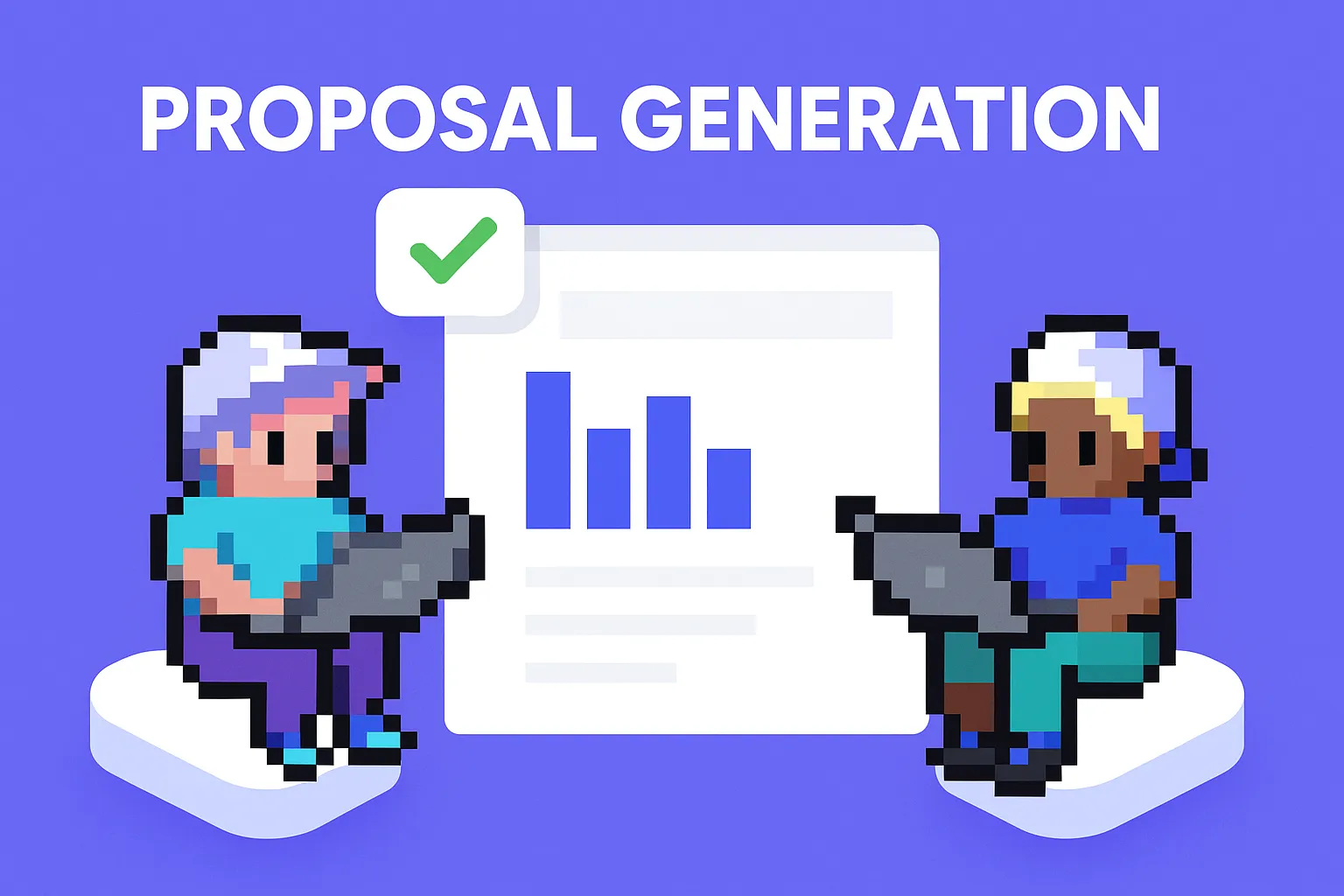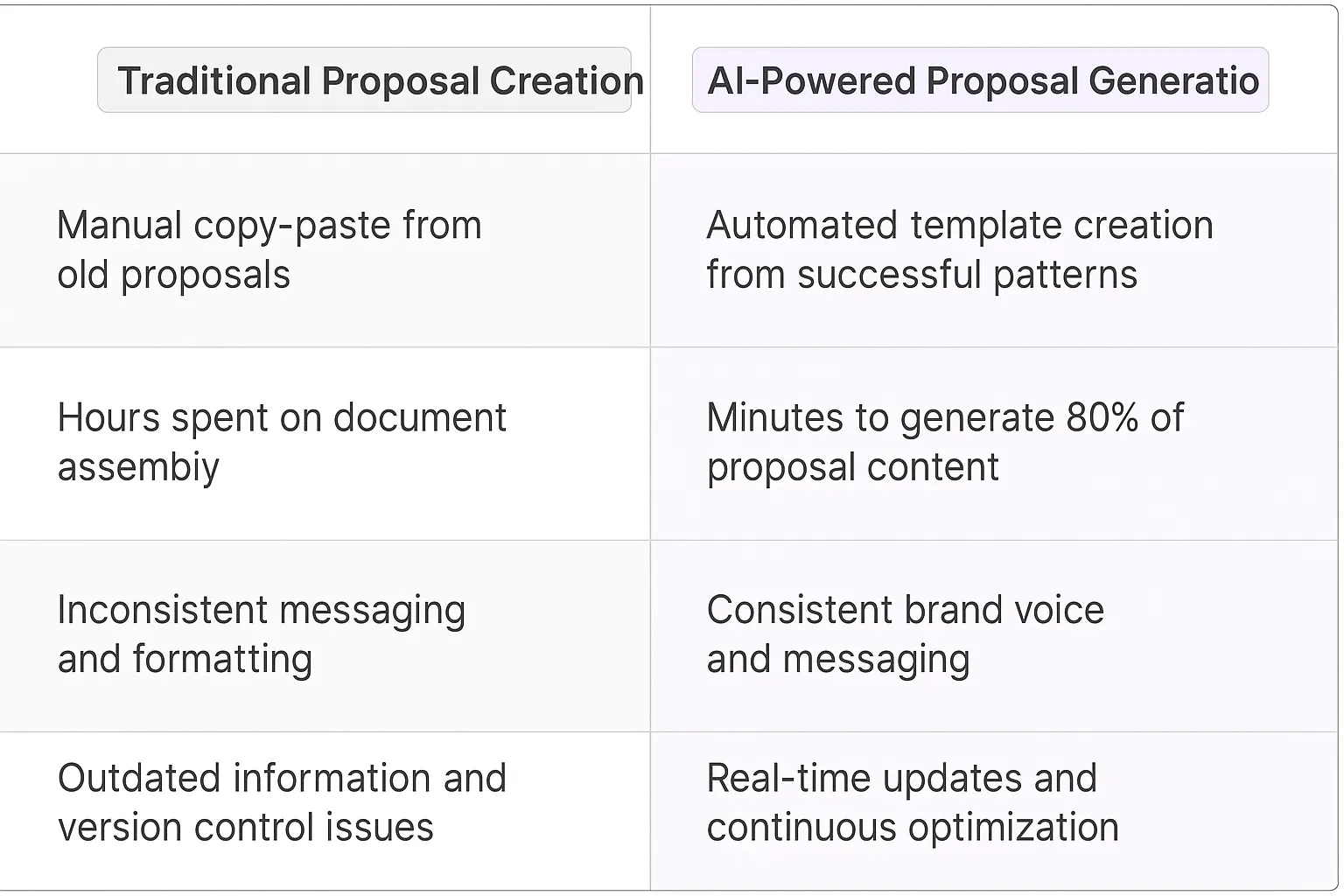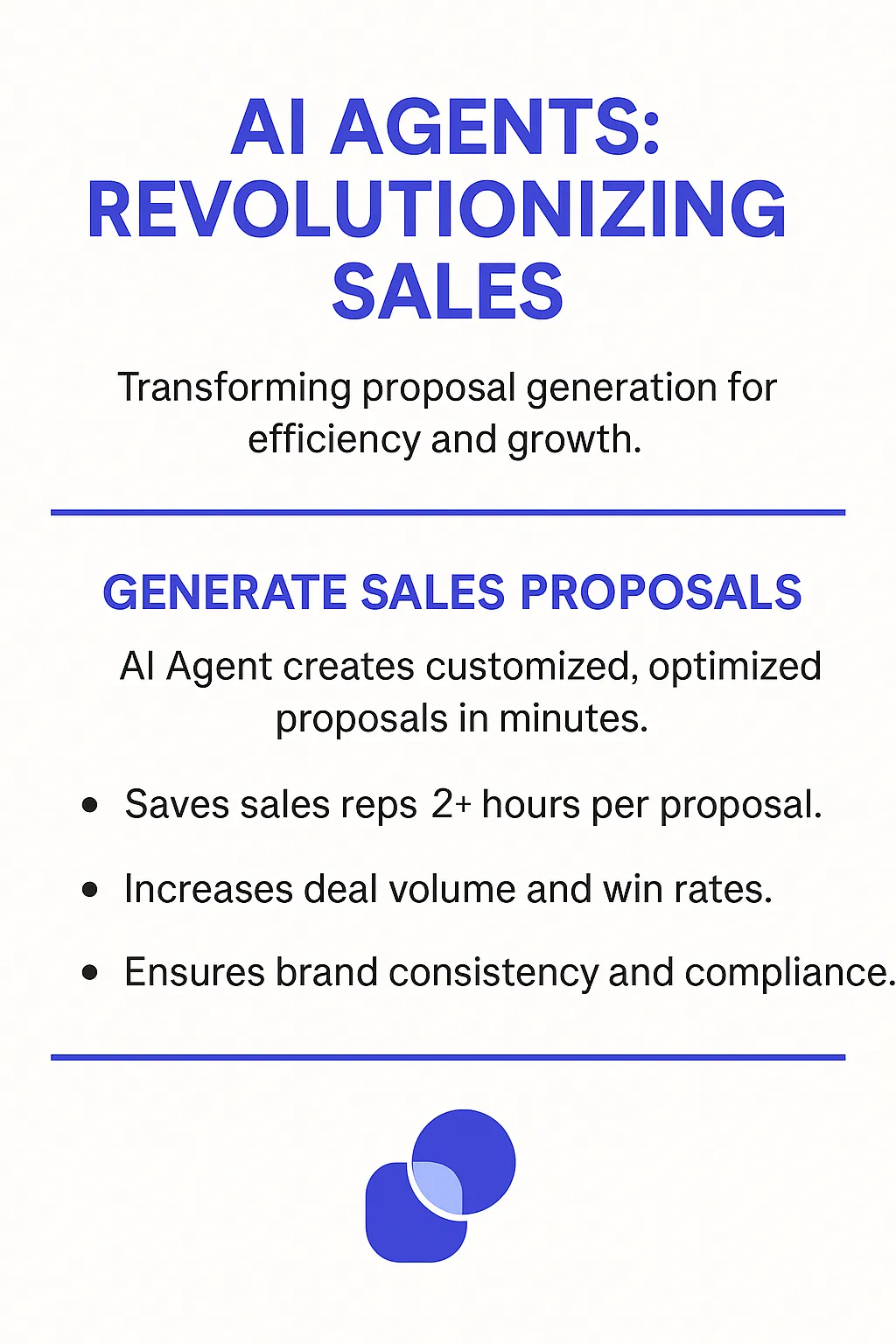Proposal Template Generation AI Agents
Understanding AI-Powered Proposal Generation
Proposal template generation powered by AI agents represents a fundamental shift in how organizations approach sales documentation. The technology analyzes successful proposals, understands industry-specific requirements, and generates highly customized templates that reflect your company's unique value propositions. Unlike traditional template systems, these digital teammates learn from each interaction, continuously refining their understanding of what drives successful outcomes.
Key Features of Proposal Template Generation
- Pattern recognition that identifies winning proposal elements
- Dynamic content generation based on customer segments
- Automated version control and brand compliance
- Win/loss analysis for continuous optimization
- Integration with existing sales data and CRM systems
- Personalization at scale across different industries

Benefits of AI Agents for Proposal Template Generation
What would have been used before AI Agents?
The traditional proposal creation process has been a massive time sink for sales teams. They'd spend hours digging through old proposals, copying and pasting sections, and manually customizing each document. Sales reps would maintain sprawling folders of template fragments, struggle with version control, and often recreate similar content multiple times. The result? Inconsistent messaging, outdated information, and countless hours spent on document assembly rather than actual selling.
What are the benefits of AI Agents?
Digital teammates fundamentally transform the proposal creation workflow through pattern recognition and adaptive learning. They analyze your best-performing proposals, understand your company's unique value propositions, and generate highly relevant content that matches your brand voice.
The network effects are particularly powerful here - each new proposal created helps the AI agent better understand what resonates with specific customer segments. Instead of starting from scratch, sales teams can now generate 80% of a proposal in minutes, focusing their energy on the critical 20% that requires human creativity and relationship insight.
Beyond just speed, these AI agents bring consistency and quality control to proposal generation. They maintain perfect version control, automatically incorporate the latest product updates, and ensure compliance with brand guidelines. The real game-changer is their ability to learn from win/loss data - they identify which proposal elements correlate with successful deals and optimize future templates accordingly.
What's fascinating is how this shifts the role of salespeople. Rather than being document assemblers, they become strategic editors and relationship architects. The AI handles the heavy lifting of content generation, while humans focus on adding the personal touch and strategic insights that truly move deals forward.
The compounding benefits are clear: shorter sales cycles, higher proposal quality, and more time for high-value selling activities. This isn't just about automation - it's about augmenting human capabilities in a way that makes the entire sales process more effective.

Potential Use Cases of AI Agents for Proposal Template Generation
Processes
- Analyzing past successful proposals to identify winning patterns and key elements
- Customizing proposal structures based on specific industry requirements and client preferences
- Automatically formatting and styling proposals according to brand guidelines
- Creating dynamic pricing tables and ROI calculations
- Generating executive summaries from detailed proposal content
Tasks
- Converting bullet points into compelling narrative sections
- Drafting project timelines and milestone schedules
- Creating tailored value propositions based on client pain points
- Generating relevant case studies and social proof sections
- Building customized solution architectures and implementation plans
- Developing detailed scope of work documents
The Growth Loop of AI-Powered Proposal Generation
When we look at proposal generation through the lens of growth loops, we see a fascinating pattern emerge. Each proposal created by an AI agent feeds back into the system, creating a compounding effect that makes future proposals even more effective.
The most successful teams I've worked with use AI agents as proposal co-pilots, not just template fillers. They're finding that AI can analyze win/loss patterns across hundreds of previous proposals, identifying the subtle elements that tip deals in their favor. This creates a powerful feedback loop: more proposals lead to better data, which leads to smarter templates, which leads to higher win rates.
What's particularly interesting is how this scales across different market segments. Enterprise sales teams are using AI agents to generate complex, multi-million dollar proposals that require deep customization, while SMB-focused teams are leveraging the same technology to create high-volume, targeted proposals that still feel personal.
The key insight here is that proposal generation isn't just about automating document creation - it's about building a systematic advantage in how companies communicate value. The teams that get this right are seeing 2-3x improvements in their proposal acceptance rates.

Industry Use Cases
Proposal template generation represents one of those fascinating intersections where AI meaningfully transforms how teams operate. I've spent years analyzing how technology adoption curves play out across different sectors, and what's striking about AI-powered proposal generation is its broad applicability. The pattern I'm seeing mirrors the early days of cloud computing - when a technology solves a universal pain point, adoption accelerates rapidly across industries.
The key dynamic at play is that proposals, regardless of industry, share common DNA - they need to be personalized, professional, and persuasive. AI agents excel at taking historical proposal data, understanding industry context, and crafting templates that hit these marks consistently. What's particularly compelling is how these digital teammates can adapt their output based on the specific industry requirements, compliance needs, and buyer psychology.
Looking at the data from companies implementing AI for proposal generation, we're seeing 60-70% reductions in template creation time, but more importantly, higher conversion rates due to better personalization. This creates a powerful growth loop: better proposals → higher win rates → more proposal data → even better templates.
Real Estate Proposal Generation: From Cold Leads to Closed Deals
Real estate agents spend countless hours crafting property proposals, often recycling the same core information while struggling to personalize each pitch. I've seen top-performing agents dedicate 2-3 hours per proposal, which significantly limits their ability to pursue new opportunities.
A Proposal Template Generation AI Agent transforms this process by analyzing historical successful proposals, property databases, and client interaction patterns. When a real estate agent identifies a new lead, they feed the AI agent key details like:
- Property specifications and unique features
- Target buyer/seller demographics
- Local market conditions
- Past transaction history
- Client pain points from discovery calls
The AI agent then generates a tailored proposal that incorporates proven closing strategies, market-specific data, and personalized elements that resonate with the prospect's needs. For example, when working with luxury property buyers, the AI emphasizes unique architectural features and investment potential, while first-time homebuyers receive more educational content about the buying process and financing options.
The most compelling aspect? Real estate agents using these AI-powered proposals report a 40% increase in response rates and a 25% reduction in time-to-close. One agent in the San Francisco Bay Area closed 12 additional deals in a quarter simply because they could pursue more leads with personalized proposals.
This isn't just about automation - it's about scaling relationship-building through technology. The AI learns from each interaction, continuously refining its understanding of what motivates different types of clients to move forward with a deal.
Management Consulting Proposals: Scaling High-Value Client Acquisition
Management consultants face a unique challenge - they need to demonstrate deep industry expertise while crafting highly customized proposals for potential clients. I've worked with consulting firms where partners spend 15-20 hours per week just on proposal creation, taking valuable time away from client work and strategic planning.
A Proposal Template Generation AI Agent fundamentally changes this dynamic by leveraging vast databases of successful consulting engagements, industry research, and client success stories. When consultants identify a new opportunity, they input critical data points like:
- Client industry vertical and size
- Specific business challenges identified
- Stakeholder priorities and KPIs
- Competitive landscape analysis
- Previous similar engagements
The AI agent synthesizes this information to create proposals that blend proven methodologies with client-specific insights. For strategy projects, it emphasizes ROI metrics and transformation roadmaps, while operational improvement proposals focus on efficiency gains and cost reduction frameworks.
The results are striking - consulting firms using AI-generated proposals report 60% faster proposal creation times and a 35% higher win rate. One mid-sized consulting firm in Chicago landed three Fortune 500 clients in six months by rapidly responding to RFPs with highly personalized proposals that previously would have taken weeks to develop.
What's particularly fascinating is how the AI agent learns from proposal feedback and win/loss data. It identifies patterns in successful proposals - from the optimal project timeline structure to the most compelling case study formats - and applies these insights to future generations. This creates a continuous improvement loop that gets smarter with each proposal iteration.
The most successful consulting firms aren't just using this technology to save time - they're leveraging it to scale their expertise and compete more effectively against larger firms. By automating the foundational elements of proposal creation, consultants can focus their energy on adding the unique strategic insights that truly differentiate their offerings.
Considerations & Challenges
Technical Integration Hurdles
Building proposal template generation into existing systems requires careful navigation of several technical obstacles. The AI model needs access to historical proposal data, pricing structures, and company-specific formatting requirements - but this data often lives in disconnected systems. Many organizations store their proposal components across SharePoint, Google Drive, and local servers, making unified access a significant challenge.
The AI also needs to understand context-specific terminology and industry jargon while maintaining consistency with your brand voice. Training the model on your specific vertical market's language patterns takes time and continuous refinement.
Data Quality & Governance
The output quality of proposal templates directly correlates with the training data quality. Organizations often discover their existing proposals contain outdated information, inconsistent formatting, or conflicting pricing models. Before implementation, a thorough audit and cleanup of historical proposal data becomes essential.
Security protocols around sensitive pricing information and client data require sophisticated permission structures. The AI needs to know which team members can access specific proposal sections while maintaining compliance with data protection regulations.
Change Management Realities
Sales teams often develop personal proposal creation workflows over years. Shifting to AI-generated templates can face resistance, especially from veteran team members who've perfected their approach. Creating a transition strategy that demonstrates clear value while preserving space for human expertise becomes crucial.
The learning curve extends beyond just using the new system - teams need to understand how to effectively review and customize AI-generated content. This requires developing new skills in prompt engineering and template modification.
Maintenance Requirements
Proposal templates aren't static - they evolve with your product offerings, market conditions, and competitive landscape. The AI system needs regular updates to reflect new services, pricing changes, and refined value propositions. This ongoing maintenance demands dedicated resources and clear update protocols.
Regular performance monitoring becomes essential to catch any drift in template quality or relevance. Setting up feedback loops from both sales teams and clients helps identify areas where the AI needs refinement.
Transformative Impact of AI Proposal Systems
The adoption of AI-powered proposal generation marks a critical inflection point in sales enablement. Looking at the data, organizations implementing this technology consistently see 2-3x improvements in proposal acceptance rates while dramatically reducing creation time. The network effects are particularly compelling - each proposal generated makes the system smarter, creating a sustainable competitive advantage.
What makes this technology truly transformative isn't just the efficiency gains - it's how it fundamentally shifts the role of sales teams from document creators to strategic relationship builders. As these systems mature, we'll likely see even more sophisticated applications, particularly in complex enterprise sales environments where proposal customization has traditionally been a major bottleneck.
The organizations that master this technology now will build significant moats through their accumulated proposal data and optimized templates. This isn't just another sales tool - it's a fundamental reimagining of how we create and deliver value propositions at scale.













